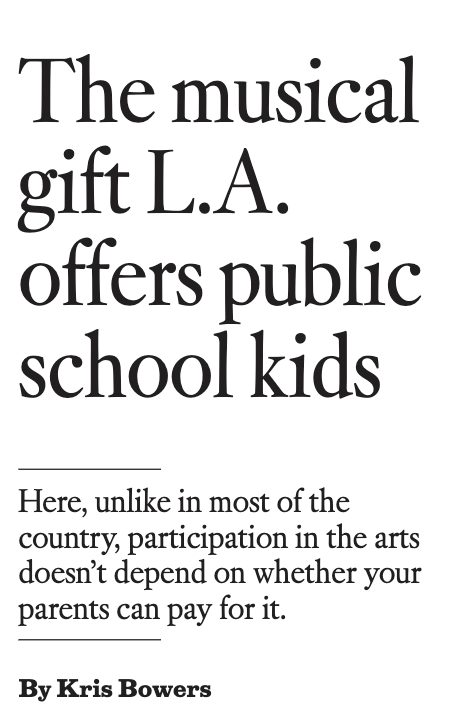The Musical Gift L.A. Offers Public School Kids
January 12, 2024
Share this post:

By Kris Bowers
It was a perfect summer’s day in June 1999. As a tender 10-year-old, I nervously approached the 1952 mahogany Winter baby grand piano that sat in the courtyard, center stage. I had been invited to perform solo for the students and their parents at my fifth-grade graduation ceremony at Third Street School in Los Angeles.
As I took the bench to play Clementi’s lively Sonatina in C major, even in the summer heat, my fingertips were ice cold as they grazed the keys in the silence before I began. It was my first major public performance. After a moment, everything around me disappeared, and I felt it was just me and the piano. Now, I know it was me, the piano — and Steve Bagmanian.
Last August, more than 24 years later, I found myself walking across the familiar hardwood of the Eastwood Scoring Stage on the Warner Bros. lot in Burbank to record my seventh film score there. You may not have heard of this room, but I’m willing to bet you’ve listened to it.
Built just after the advent of sound in films in 1929, this 5,000-square-foot stage has been used to record thousands of movie scores, from “Casablanca” to “The Color Purple,” for which I composed the score. It’s one of those “if you know, you know” places in Los Angeles that has witnessed as much music history as almost any other room in the world.
On this occasion, the 94-year-old landmark was welcoming students, alumni and staff of the Los Angeles Unified School District. As I approached the piano, I found Steve Bagmanian, who rose to greet me with a big hug. Steve is a piano tuner, and the person who manages the Los Angeles Unified School District’s musical instrument repair shop.
He was there because he’s at the center of a short documentary I co-directed called “The Last Repair Shop,” which gave me the opportunity to meet the people who make music education tick in this city. It turns out that Steve was the tuner of the pianos I played in elementary school. Steve and generations of LAUSD alumni were at the Eastwood stage to shoot a special performance of “The Alumni,” which I wrote for the end of the film.
It came as a surprise to me that Los Angeles is one of the last big cities in the U.S. to provide public school students with free musical instruments. We’re a bastion of music education compared with most of the country, where participation in the arts largely depends on whether your parents can pay for it. Despite all the studies that show that students engaged in the arts are not only more likely to excel academically but also to develop creativity, confidence and collaboration, getting funding for arts education has been an uphill battle.
Amid a global pandemic and a mental health crisis, there is the legitimate worry that we are raising a “lost generation.” Is music the answer?
We know that schools with music programs have higher attendance rates than schools without, and a substantially higher graduation rate compared with nonmusical schools. Studies have shown that students who start music education before the age of 8 are more hopeful about the future. High school students taking music courses score significantly higher in math and science than their nonmusical peers. Students in lower-income communities with music education score higher on standardized tests.
And as the world becomes increasingly chaotic and fractured, young people need an outlet for their feelings now more than ever. Something to make sense of the tangled thoughts and tightly wound sensations that can’t be put into words. Grief and joy and confusion and hope that can only be expressed with a bow across strings or the vibration of a wet reed. Kids need healthy outlets. They need music.
Even as most public school systems struggle with budget cuts and reduced resources, Los Angeles is setting an important example. I, and millions of people like me, are living, breathing, singing, wailing, thumping, strumming, humming, crashing, thundering proof that an investment in music not only lights a young person’s heart on fire but warms us all.
People like Steve, who work tirelessly to keep the music alive in our schools, can’t do it alone.
Indeed, it is the will of Angelenos that has said, “Play on” to the students of this city, with no strings attached. It is the will of Angelenos that has kept the free instruments and repairs program alive all these years, recognizing an asset that truly changes young lives.
City of angels, indeed.
Kris Bowers , a pianist, composed the scores for many movies and TV series, including “The Color Purple,” “Green Book,” “King Richard” and “Bridgerton.” He is the co-director and producer of “The Last Repair Shop,” a short documentary film about LAUSD’s musical instrument repair shop.
Related Posts
November 21, 2024
TRIO CASALS (Alexandr Kislitsyn, Anna Kislitsyna, Ovidiu Marinescu) premiered “NEVERTHELESS” at Weill Recital Hall @ Carnegie Hall, November 10, 2023. [...]
November 8, 2024
Watch on YouTube “All Unto Me” is a tribute to Archbishop Desmond Tutu of South Africa, a longtime friend of [...]
